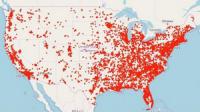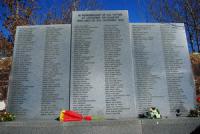-
Why the next terror manifesto could be even harder to track
Just before his shooting spree at two Christchurch, New Zealand mosques, the alleged mass murderer posted a hate-filled manifesto on several file-sharing sites. Soon, the widespread adoption of artificial intelligence on platforms and decentralized tools like IPFS will mean that the online hate landscape will change. Combating online extremism in the future may be less about “meme wars” and user-banning, or “de-platforming,” and could instead look like the attack-and-defend, cat-and-mouse technical one-upsmanship that has defined the cybersecurity industry since the 1980s. No matter what technical challenges come up, one fact never changes: The world will always need more good, smart people working to counter hate than there are promoting it.
-
-
Recaptured Italian former militant Battisti admits 1970s murders

Former communist militant Cesare Battisti has admitted four murders carried out in the 1970s, during Italy’s so-called “Years of Lead,” weeks after being jailed in Italy for the killings that were part of a failed bid to spark a far-left revolution.
-
-
Drones pose significant cyber, privacy challenges
Growing drone use in populated areas poses significant risks that, without additional safeguards, could result in attacks by malicious entities and exploited for use in cyberattacks, terrorism, crime and invasion of privacy.
-
-
Second edition of Nuclear Nonproliferation Textbook
Brookhaven Lab has updated and published the second edition of the Nuclear Nonproliferation Textbook, originally published in 2013. The new release describes important changes that have since been implemented in the International Atomic Energy Agency’s (IAEA) safeguards system for the peaceful use of nuclear energy and documents the IAEA’s verification role in Iran that began in 2015.
-
-
More mass shooting in states with permissive gun laws

States with more permissive gun laws and greater gun ownership have higher rates of mass shootings, and a growing divide is emerging between states with restrictive versus permissive gun laws. According to a new study, researchers found that in most years permissive states had higher mass shooting rates compared to restrictive states.
-
-
AG: Muller did not find that Trump’s campaign “conspired with the Russian government” 2016 election interference effort
On Saturday afternoon, Attorney General William Barr sent Congress his “principal conclusions” of the Mueller report. Barr quotes the Mueller report to say that “[T]he investigation did not establish that members of the Trump Campaign conspired or coordinated with the Russian government in its election interference activities.” The Mueller report does not take a position on whether or not Trump engaged in obstruction of justice. Barr writes: “The Special Counsel… did not draw a conclusion — one way or the other — as to whether the examined conduct constituted obstruction.” The AG quotes the report to say that “while this report does not conclude that the President committed a crime, it also does not exonerate him.”
-
-
Dunford: Google’s work with China “challenges” U.S. military advantage

The top U.S. military officer has called out U.S. technology giant Google for its artificial intelligence venture in China, saying it “creates a challenge” in maintaining a U.S. military advantage over the Chinese.
-
-
Assessing the risk of violence by extremists
A new directory has been assembled from frameworks that have been developed in recent years to assess aspects of extremist violence, a term used to encompass terrorist violence that is framed by ideology and targeted violence that is framed by idiosyncratic beliefs. A new CREST report published today provides detail on several frameworks that are used to assess risks of extremist violence.
-
-
Social media create a spectacle society that makes it easier for terrorists to achieve notoriety

The shocking mass-shooting in Christchurch last Friday is notable for using livestreaming video technology to broadcast horrific first-person footage of the shooting on social media. The use of social media technology and livestreaming marks the attack as different from many other terrorist incidents. It is a form of violent “performance crime.” That is, the video streaming is a central component of the violence itself, it’s not somehow incidental to the crime, or a disgusting trophy for the perpetrator to re-watch later. In an era of social media, which is driven in large part by spectacle, we all have a role to play in ensuring that terrorists aren’t rewarded for their crimes with our clicks.
-
-
Exploring how propaganda is used to recruit terrorists
How do terrorists use propaganda to entice people to join their ranks? Which personality types are the most influenced by it and what types of messaging are most effective in countering these recruitment campaigns? A DOD-funded research hopes to stem recruitment of individuals to terrorist cells – particularly young people age 18 to 26, the most targeted demographic.
-
-
Biotechnology advances offer opportunities for actors with malicious intent
Over the past decade, the biotechnology economy has experienced remarkable growth, resulting in the rapid expansion of biological knowledge and application. These advances create openings for actors with malicious intent to harness readily available tools and techniques to create biological threats or bioweapons.
-
-
Former East German agents questioned in Lockerbie bombing probe

Hundreds were killed when Pan Am Flight 103 exploded over the Scottish village of Lockerbie in December 1988. Libya later took responsibility and paid compensation to the victims’ families — and one of its secret agents spent eleven years in jail for the attack. Scottish and German investigators, acting on newly revealed information, are now looking onto the possibility that agents of STASI — East Germany’s secret police — were involved.
-
-
Bosnian massacre survivors hail UN court ruling on Karadzic sentence
Relatives of victims of the Srebrenica massacre have hailed a UN court decision that ordered Bosnian Serb wartime leader Radovan Karadzic to serve the rest of his life in prison on genocide and war crimes charges. Karadzic was found guilty for his role in the July 1995 Srebrenica massacre of more than 8,000 Muslim men and boys by Bosnian Serb forces. It was the worst atrocity in Europe since World War II.
-
-
Satellite technology detects, and may prevent, genocide
Many of the world’s worst human rights abuses, including genocides, occur in areas that are difficult to observe. “Smallsat” — short for small satellite — technology can detect human rights abuses and violations. The information collected by this technology provides evidence that can be used to corroborate refugee accounts of atrocities in international courts.
-
-
Corbyn comments from 2011 lamenting creation of Israel due to “Zionist forces” surface

The British Labour Party faced fresh accusations of anti-Semitism on Wednesday amid reports that leader Jeremy Corbyn accused Britain of “conceding to Zionist forces” in allowing the creation of the State of Israel.
-
More headlines
The long view
Factories First: Winning the Drone War Before It Starts
Wars are won by factories before they are won on the battlefield,Martin C. Feldmann writes, noting that the United States lacks the manufacturing depth for the coming drone age. Rectifying this situation “will take far more than procurement tweaks,” Feldmann writes. “It demands a national-level, wartime-scale industrial mobilization.”
No Nation Is an Island: The Dangers of Modern U.S. Isolationism
The resurgence of isolationist sentiment in American politics is understandable but misguided. While the desire to refocus on domestic renewal is justified, retreating from the world will not bring the security, prosperity, or sovereignty that its proponents promise. On the contrary, it invites instability, diminishes U.S. influence, and erodes the democratic order the U.S. helped forge.
Fragmented by Design: USAID’s Dismantling and the Future of American Foreign Aid
The Trump administration launched an aggressive restructuring of U.S. foreign aid, effectively dismantling the United States Agency for International Development (USAID). The humanitarian and geopolitical fallout of the demise of USAID includes shuttered clinics, destroyed food aid, and China’s growing influence in the global south. This new era of American soft power will determine how, and whether, the U.S. continues to lead in global development.
Water Wars: A Historic Agreement Between Mexico and US Is Ramping Up Border Tension
As climate change drives rising temperatures and changes in rainfall, Mexico and the US are in the middle of a conflict over water, putting an additional strain on their relationship. Partly due to constant droughts, Mexico has struggled to maintain its water deliveries for much of the last 25 years, deliveries to which it is obligated by a 1944 water-sharing agreement between the two countries.
How Disastrous Was the Trump-Putin Meeting?
In Alaska, Trump got played by Putin. Therefore, Steven Pifer writes, the European leaders and Zelensky have to “diplomatically offer suggestions to walk Trump back from a position that he does not appear to understand would be bad for Ukraine, bad for Europe, and bad for American interests. And they have to do so without setting off an explosion that could disrupt U.S.-Ukrainian and U.S.-European relations—all to the delight of Putin and the Kremlin.”
How Male Grievance Fuels Radicalization and Extremist Violence
Social extremism is evolving in reach and form. While traditional racial supremacy ideologies remain, contemporary movements are now often fueled by something more personal and emotionally resonant: male grievance.
